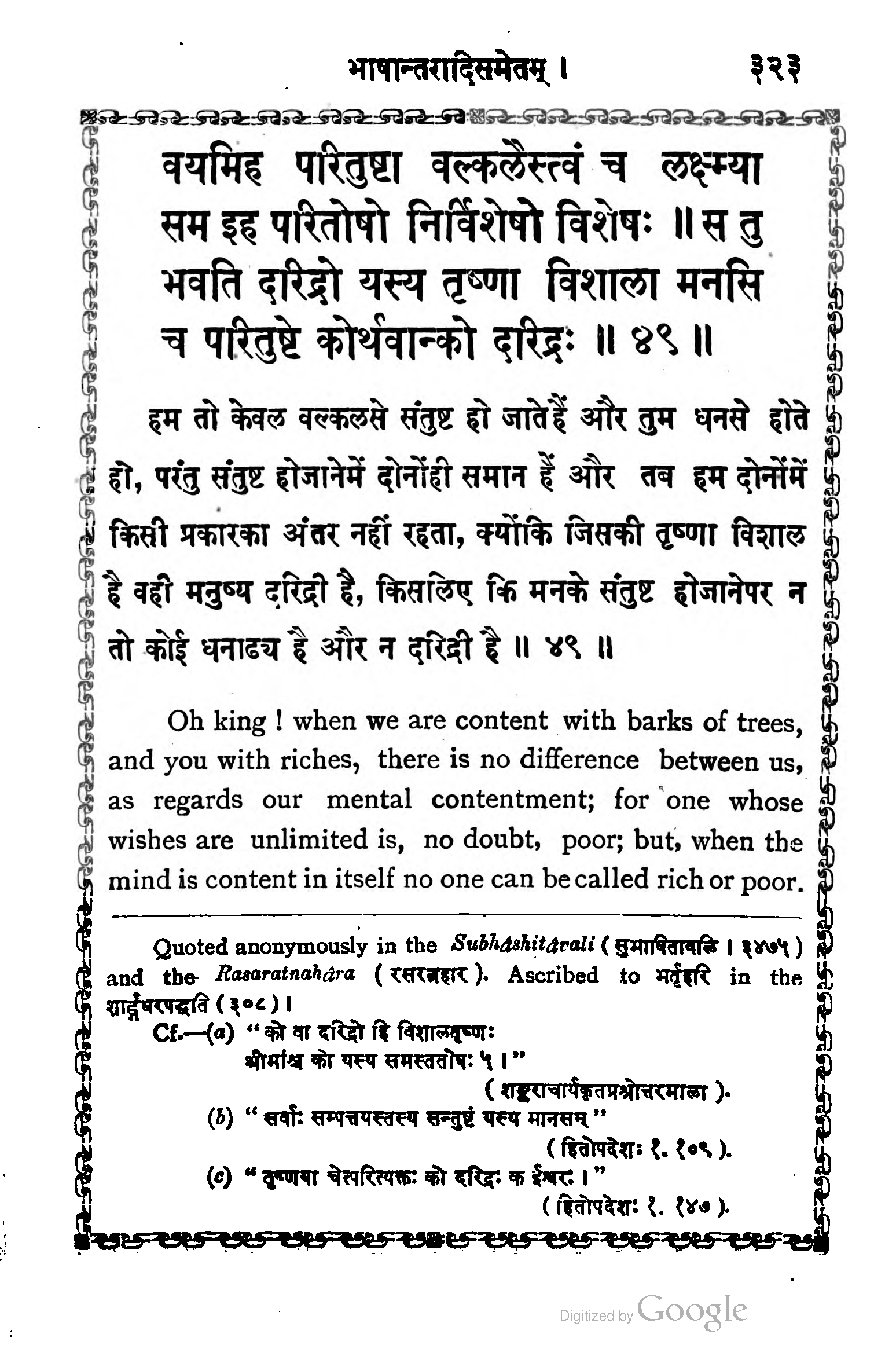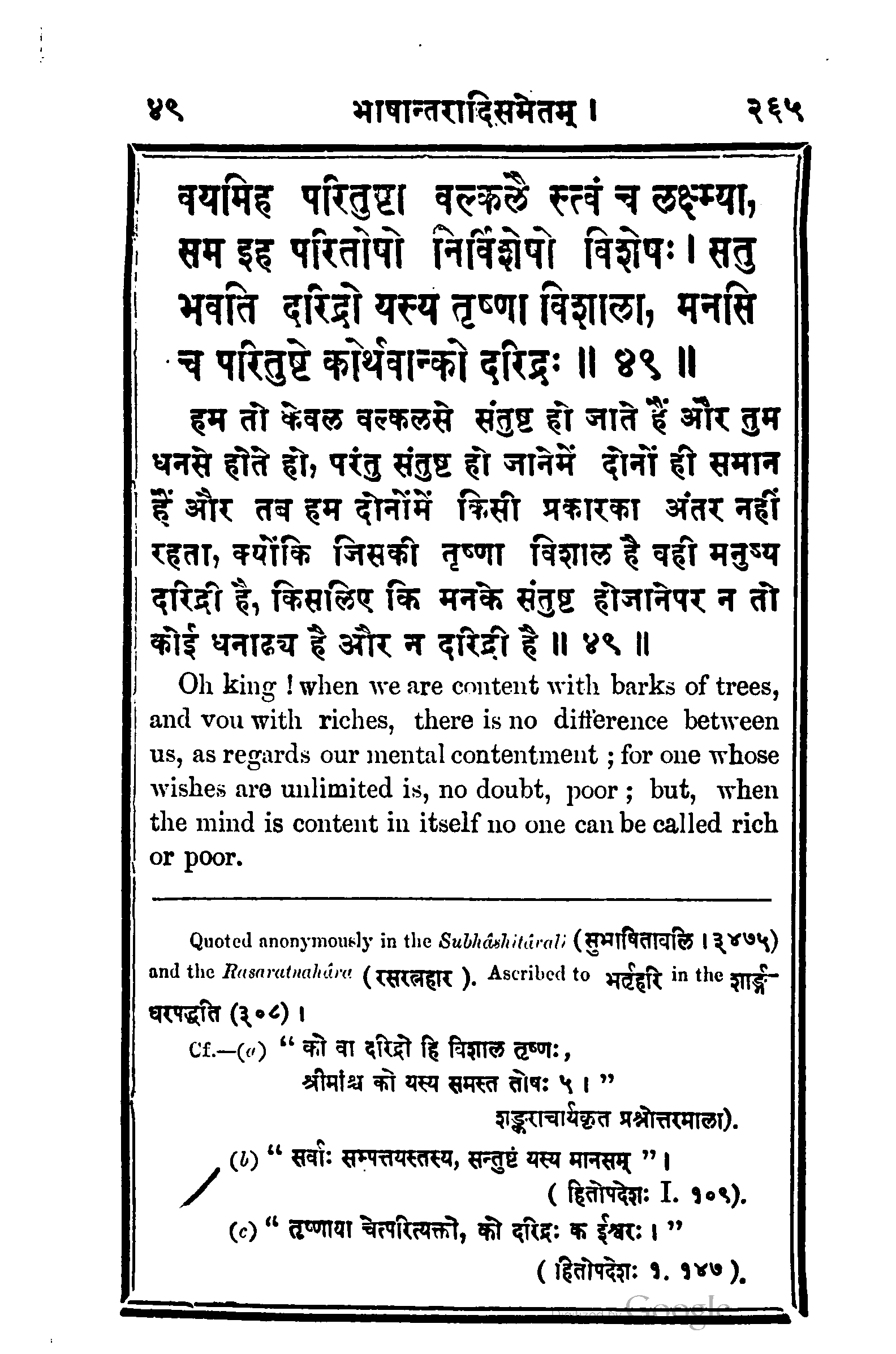Brough
Tawney
Mādhavānanda
Telang
verse

Text (not proofread)
बयमिह परितुष्टा वल्कलैस्त्वं च लक्ष्म्या
सम इह परितोषो निर्विशेषो विशेषः ।
स तु भवतु दरिद्रो यस्य तृष्णा विशाला
मनसि च परितुष्टे कोर्थवान्को दरिद्रः ॥ ५० ॥
footnote

Text (not proofread)
I. ( a ) च लभ्या ; दुकूलै : T. K. Bo . ( orig . Bon . ) G. N. ( b ) इ ; १० .
A. ° ° C . ° बावि Bon . ( orig . Bo . ) ( 6 ) ° वनु ; ° वसि . C.
A. P. R. G. T. ° द्रो ; द्वी . A. T , G. ( @ ) ° द्रः ; ° द्री . A. T
endnote

Text (not proofread)
St. L. - इह = अस्मिन् संसारे Ramarshi says विश्वस्मिन् which I do
not understand . : is a better reading than as
marking better the contrast with Tð - Añචft : is some
what puzzling . Ramarshi says अत्र विशेष : अन्तरं भेद इत्यर्थ : निर्विशेष :
Biday : : * T * : . But this is not satisfactory .
Perhaps : should be taken as meaning " greatness "
see Naishadha III . , 41 and commentary . Máliní .
Kosambi
verse

Text (not proofread)
वयमिह परितुष्टा वल्कलैस् त्वं च लक्ष्म्या
सम इह परितोषो निर्विशेषो विशेषः ।
स तु भवतु दरिद्रो यस्य तृष्णा विशाला
मनसि च परितुष्टे कोऽर्थवान् को दरिद्रः ॥ १७७ ॥
footnote

Text (not proofread)
177 ) a Y7.8 अपि ( for इह ) . Y2 परितृप्ता . F3 W X Y1 – 3.7.8 T G1.45 M
दुकूलै : ( for च लक्ष्म्या ) . – 4 ) B2 समम् . C D F1 J1 2 Y1B 4-0 1 6T T G5 इव ; Y8 इति ; M +
-हित ( for इह ) . M3 परितोषे . E निर्विशेषा ( Eot.3 षो ) वशेष :; X 1 निर्विशोको विशेषः ;
G + निर्विकल्पो विशेषः - " ) F2 स च ; T3 सति . CH W2.3.1c Y1 . 8 – – 8 T3 G1-3 M2 भवति .
W दरिद्वी ~ ) Eo . 4. 4 ( and Ec ) I तु ( for च ) . F1 दरिद्री
BIS . 5941 ( 2722 ) Bhartṛ . ed . Bohl . and Haeb . 3. 54. lith . ed . I. 45 , II . and
Galan 50. lith . ed . III . 55. Dasarūpāvaloka 4. 12. ( ज्ञानाद्यथा भर्तृहरिशतके ) ; Sp . 308
( Bh ) ; SRB . p . 75. 17 ( Bh . ) ; SBH . 3475 ; SDK 5. 64 4 ( p . 320 , Krsnamiśra ) ;
SRK . p . 53. 2 ( Bh . ) . Rasaratnahara ; Rasaratnapradīpikā ; SHV . f . 76a . 846 ; SK ,
2. 230 ; SU . 1596 .

